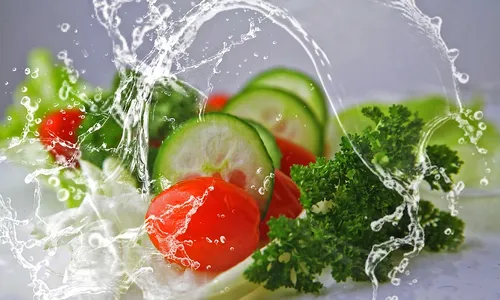Is Your Body Screaming for Help? 10 Anti-Inflammatory Superfoods Ready to Rescue You!

Remember that time you bent down to pick up a sock and your back decided to stage a full-blown protest? Or when your knee felt like it was auditioning for a role as a rusty hinge? Yeah, that’s inflammation talking. It’s like your body’s internal smoke alarm, going off when things get a little… heated. While some inflammation is a good guy – helping you heal from injuries – chronic inflammation is the unwelcome guest who overstays their welcome, causing all sorts of trouble. But fear not, my friend! Your kitchen can be your secret weapon in this battle. Forget complicated potions and expensive supplements; nature has gifted us with a delicious arsenal of anti-inflammatory foods. Let's dive into 10 of these culinary superheroes that deserve a permanent spot on your grocery list and in your belly!
1. Turmeric: The Golden Child of Anti-Inflammation
Imagine a spice that not only adds a vibrant hue and earthy flavor to your dishes but also packs a serious anti-inflammatory punch. That’s turmeric for you! This golden spice gets its superpowers from a compound called curcumin. Think of curcumin as the tiny, caped crusader within turmeric, diligently fighting off inflammation at a cellular level. Studies have shown its potential in easing symptoms of arthritis and even playing a role in preventing chronic diseases. So, how do you unleash this golden power? Stir it into your curries, blend it into smoothies, whisk it into your morning latte (hello, golden milk!), or even add a pinch to your scrambled eggs. Just remember, curcumin’s absorption gets a boost when paired with black pepper – a dynamic duo for your health!
2. Ginger: The Spicy Sidekick with Soothing Powers
Ginger, turmeric's spicy cousin, is another fantastic anti-inflammatory ally. Its pungent and zesty flavor isn't just delicious; it's also loaded with gingerol, a bioactive compound with impressive anti-inflammatory and antioxidant properties. Feeling a bit nauseous? Ginger can help. Got muscle soreness after that killer workout? Ginger might offer some relief. Suffering from joint pain? You guessed it – ginger could be your new best friend. From stir-fries and soups to teas and even baked goods, ginger is incredibly versatile. Try grating fresh ginger into your hot lemon water for a soothing morning ritual, or add it to your next batch of homemade cookies for a spicy kick and a health boost.
3. Berries: Tiny Packages of Powerful Protection
Who doesn’t love a handful of juicy, sweet berries? Whether it’s blueberries, strawberries, raspberries, or blackberries, these little gems are bursting with flavor and, more importantly, antioxidants. These antioxidants, including anthocyanins, are potent anti-inflammatory compounds that help protect your cells from damage. Think of them as tiny shields deflecting the harmful free radicals that contribute to inflammation. Toss them into your breakfast yogurt, blend them into smoothies, sprinkle them on your oatmeal, or simply enjoy them as a guilt-free snack. The more colorful your berry mix, the wider the range of beneficial antioxidants you’ll be getting!
4. Fatty Fish: Omega-3 Rich Warriors Against Inflammation
Salmon, mackerel, sardines, and tuna – these aren't just tasty additions to your meals; they're also packed with omega-3 fatty acids, particularly EPA (eicosapentaenoic acid) and DHA (docosahexaenoic acid). These omega-3s are like the calm and collected diplomats of your body, helping to resolve inflammation and keep things peaceful internally. They’ve been linked to a reduced risk of heart disease, arthritis, and even certain types of cancer. Aim to include fatty fish in your diet a couple of times a week. Grill it, bake it, pan-sear it – however you like it, your body will thank you for the dose of healthy fats.
5. Leafy Greens: The Unsung Heroes of Health
Popeye was onto something! Spinach, kale, collard greens, and other leafy greens are nutritional powerhouses, loaded with vitamins, minerals, and, you guessed it, anti-inflammatory compounds. They’re rich in antioxidants and phytonutrients that help combat inflammation and support overall health. Don’t just relegate them to salads! Blend them into smoothies (you’ll barely taste them, promise!), sauté them with garlic, add them to soups and stews, or even bake them into crispy chips. The more greens you eat, the happier your body (and your gut) will be.
6. Olive Oil (Extra Virgin, Please!): Liquid Gold for Your Health
That bottle of extra virgin olive oil sitting on your counter isn't just for drizzling on salads. It’s a source of oleocanthal, a natural compound with anti-inflammatory properties similar to ibuprofen. Think of it as a delicious, natural pain reliever! But not all olive oils are created equal. Opt for extra virgin olive oil, as it’s less processed and retains more of its beneficial compounds. Use it in your salad dressings, for light sautéing, or as a finishing touch to your dishes. Just avoid high-heat cooking, as it can diminish some of its health benefits.
7. Nuts and Seeds: Crunchy Bites of Anti-Inflammatory Goodness
Almonds, walnuts, chia seeds, flax seeds – these little powerhouses are packed with healthy fats, fiber, and antioxidants, all of which contribute to their anti-inflammatory effects. Walnuts, in particular, are rich in omega-3 fatty acids. Nuts and seeds are also great sources of vitamin E, another potent antioxidant. Grab a handful as a snack, sprinkle them on your yogurt or oatmeal, or add them to your salads for a satisfying crunch and a boost of anti-inflammatory power. Just be mindful of portion sizes, as they can be calorie-dense.
8. Avocados: The Creamy, Dreamy Inflammation Fighter
Beyond their delicious creamy texture and healthy monounsaturated fats, avocados also contain compounds like vitamin E, carotenoids, and phytosterols, all of which have anti-inflammatory properties. They’re also a good source of fiber, which plays a role in gut health and can indirectly influence inflammation levels in the body. Spread it on your toast, blend it into smoothies, mash it into guacamole, or simply enjoy it with a sprinkle of salt and pepper. This versatile fruit (yes, it’s a fruit!) is a delicious way to fight inflammation.
9. Green Tea: Sip Your Way to Reduced Inflammation
Forget sugary drinks; reach for a cup of green tea instead! This ancient beverage is rich in antioxidants called catechins, particularly EGCG (epigallocatechin gallate), which have been shown to have significant anti-inflammatory effects. Studies suggest that regular green tea consumption may be linked to a reduced risk of various inflammatory conditions. Enjoy it hot or iced, plain or with a squeeze of lemon. It’s a refreshing and healthy way to hydrate and fight inflammation at the same time.
10. Dark Chocolate (Yes, Really!): A Treat with Benefits
Calling all chocolate lovers! Here’s some good news: dark chocolate, especially varieties with a high cocoa content (70% or more), contains flavanols, which are potent antioxidants with anti-inflammatory properties. These flavanols can help reduce inflammation and protect against cell damage. But before you reach for that milk chocolate bar, remember that moderation is key. Opt for a small square or two of high-quality dark chocolate to satisfy your sweet cravings and reap the anti-inflammatory benefits. It’s a delicious way to treat yourself while also being kind to your body.
Making These Foods Your Kitchen Staples
Incorporating these anti-inflammatory foods into your diet doesn’t have to be a chore. Start small by adding a handful of berries to your breakfast, using olive oil in your salad dressings, or sipping on a cup of green tea in the afternoon. Gradually introduce more of these powerhouses into your meals and snacks. Remember, consistency is key. By making these foods regular features in your kitchen and on your plate, you’ll be taking proactive steps towards reducing inflammation and supporting your overall health and well-being. So, go forth and conquer your kitchen – your body will thank you for it!
FAQ
Can these foods completely cure inflammation?
While these foods have powerful anti-inflammatory properties, they are part of a holistic approach to managing inflammation. They can significantly contribute to reducing chronic inflammation and its associated symptoms, but they may not completely cure underlying inflammatory conditions. It's important to consult with a healthcare professional for diagnosis and treatment.
How quickly can I expect to see results from eating these foods?
The timeframe for experiencing noticeable benefits can vary depending on individual factors such as the severity of inflammation, overall diet, and lifestyle. Some people may experience improvements in energy levels and general well-being within a few weeks, while more significant changes related to specific inflammatory conditions may take longer. Consistency is crucial for long-term benefits.
Do I need to eat all of these foods every day?
No, you don't need to eat all of these foods every single day to reap their benefits. Aim for a diverse and balanced diet that includes a variety of these anti-inflammatory foods throughout the week. The more you incorporate them into your regular eating habits, the better the cumulative effect will be.
Are there any potential side effects of consuming large amounts of these foods?
While these are generally healthy foods, consuming very large amounts of anything can potentially lead to side effects. For example, excessive turmeric intake might cause digestive issues in some individuals. It's always best to consume these foods in moderation as part of a balanced diet. If you have any specific health concerns or are taking medications, it's advisable to consult with a healthcare professional or a registered dietitian.
Can I get the same benefits from supplements?
While supplements containing compounds like curcumin or omega-3 fatty acids are available, whole foods offer a broader range of beneficial nutrients and compounds that work synergistically. The absorption and effectiveness of nutrients from whole foods can also be different from supplements. It's generally recommended to prioritize obtaining nutrients from a balanced diet whenever possible. Consult with a healthcare professional before taking any supplements.
Explore more blogs on health:




